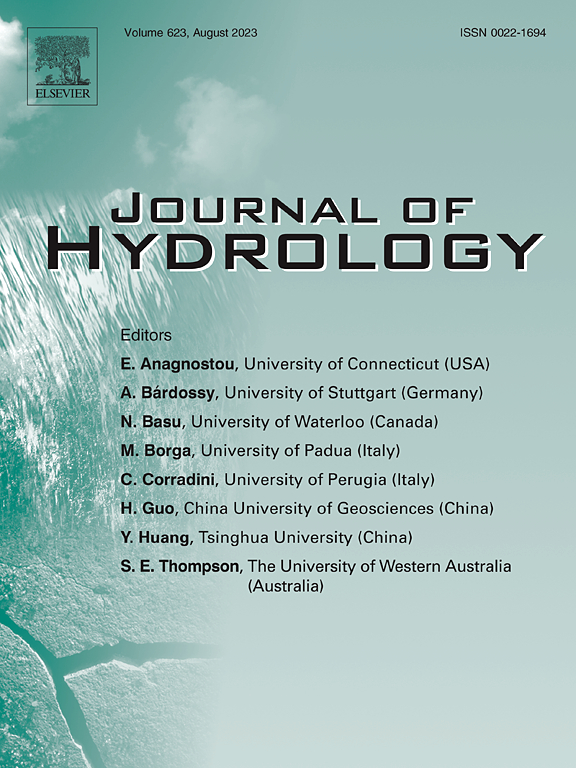Understanding riverbank erosion through the Lens of Turbulence: A review
IF 5.9
1区 地球科学
Q1 ENGINEERING, CIVIL
引用次数: 0
Abstract
The loss of land due to riverbank erosion is a crucial factor in shaping landforms and plays a significant role in fluvial geomorphology. Understanding and the quantification of the movement and the initiation of sediment particles are the key elements in various engineering and environmental studies. The entrainment and the transportation of sediment particles are controlled by many different physical processes in the sediment water interface. Among such processes, the characteristics of turbulence and the associated coherent structures within the flow are of utmost importance. Riverbank erosion is one of the major natural disasters and an issue of major concern. Flow turbulence plays an important role in riverbank erosion and in the shaping of the river planform. Eddies are pivotal in turbulence generation that sustain the random velocity fluctuations and continually distribute energy and exchange momentum through the eddy breakdown process, a feature absent in laminar flow. In this review paper a precise articulation of the characterization of turbulence parameters on riverbank erosion mechanism is presented together with different available river turbulence measurement techniques that are in use. Further, the investigations that explored the bank erosion process mechanisms both on natural riverbanks as well as in laboratory flumes in context of turbulence has also been discussed. Key insights include the impact of varying turbulence intensities on erosion rates, and the effectiveness of different turbulence parameters in the characterization of bank erosion. The review also identifies the gaps in the existing methodologies, emphasizing the need for standardizing the available techniques to enable cross-comparisons among studies. This paper provides a comprehensive summary of current measurement techniques for turbulence in riverbank regions, offering recommendations for future research and contributing valuable insights to the broader understanding of sediment transport and riverbank dynamics. Additionally, the discussion also outlines potential directions for future developments. This review paper in indented to discuss the characterisation of the turbulence parameters at the near bank region.
通过湍流透镜了解河岸侵蚀:综述
河岸侵蚀造成的土地流失是形成地貌的重要因素,在河流地貌中起着重要作用。了解和量化泥沙颗粒的运动和起爆是各种工程和环境研究的关键要素。泥沙颗粒的夹带和输运受到泥沙-水界面中许多不同物理过程的控制。在这些过程中,湍流的特性和流动中相关的相干结构是至关重要的。河堤侵蚀是主要的自然灾害之一,是人们普遍关注的问题。水流湍流对河岸侵蚀和河面形成起着重要作用。涡旋是湍流产生的关键,它维持随机的速度波动,并通过涡旋击穿过程不断地分配能量和交换动量,这是层流所没有的特征。本文综述了湍流参数对河岸侵蚀机理的精确描述,并介绍了目前使用的不同的河流湍流测量技术。此外,本文还讨论了在湍流环境下,在天然河岸和实验室水槽中对河岸侵蚀过程机制的研究。关键的见解包括不同湍流强度对侵蚀速率的影响,以及不同湍流参数在河岸侵蚀表征中的有效性。审查还指出了现有方法中的差距,强调需要使现有技术标准化,以便在研究之间进行交叉比较。本文全面总结了目前河岸地区湍流测量技术,为未来的研究提供了建议,并为更广泛地了解沉积物运输和河岸动力学提供了有价值的见解。此外,讨论还概述了未来发展的潜在方向。本文主要讨论了近岸地区湍流参数的特征。
本文章由计算机程序翻译,如有差异,请以英文原文为准。
求助全文
约1分钟内获得全文
求助全文
来源期刊

Journal of Hydrology
地学-地球科学综合
CiteScore
11.00
自引率
12.50%
发文量
1309
审稿时长
7.5 months
期刊介绍:
The Journal of Hydrology publishes original research papers and comprehensive reviews in all the subfields of the hydrological sciences including water based management and policy issues that impact on economics and society. These comprise, but are not limited to the physical, chemical, biogeochemical, stochastic and systems aspects of surface and groundwater hydrology, hydrometeorology and hydrogeology. Relevant topics incorporating the insights and methodologies of disciplines such as climatology, water resource systems, hydraulics, agrohydrology, geomorphology, soil science, instrumentation and remote sensing, civil and environmental engineering are included. Social science perspectives on hydrological problems such as resource and ecological economics, environmental sociology, psychology and behavioural science, management and policy analysis are also invited. Multi-and interdisciplinary analyses of hydrological problems are within scope. The science published in the Journal of Hydrology is relevant to catchment scales rather than exclusively to a local scale or site.
 求助内容:
求助内容: 应助结果提醒方式:
应助结果提醒方式:


